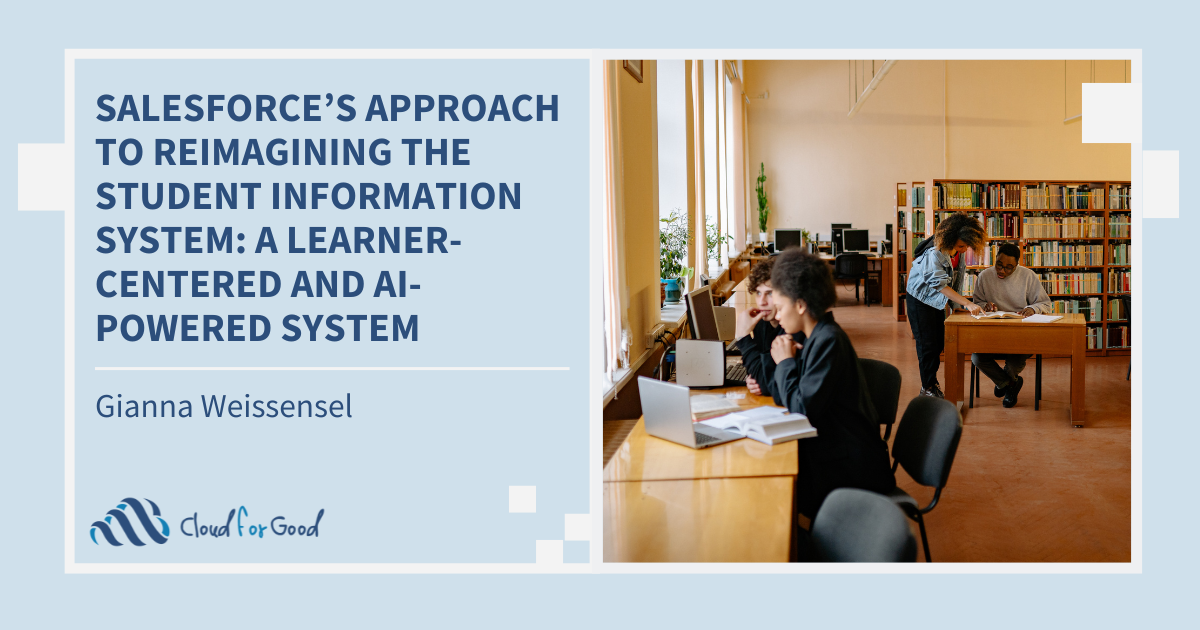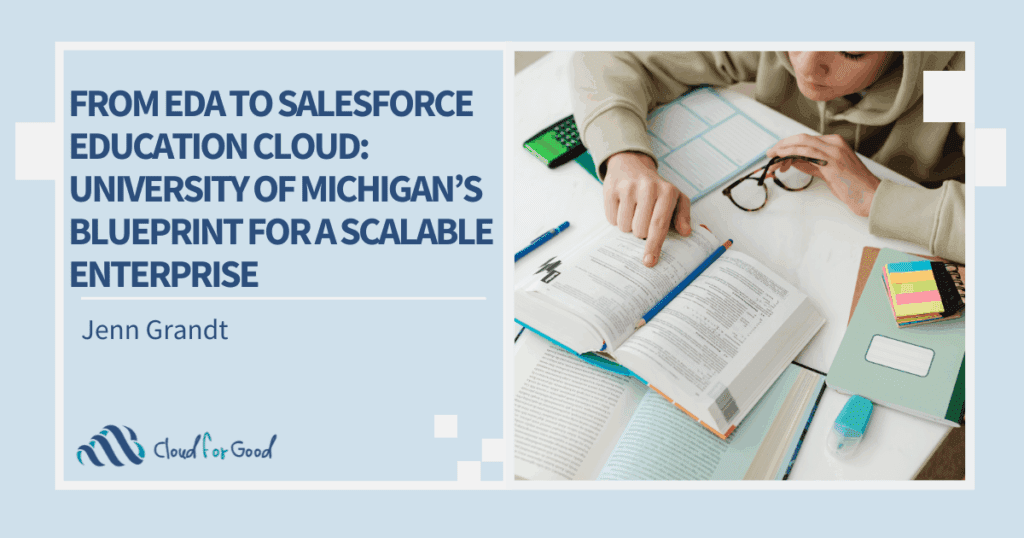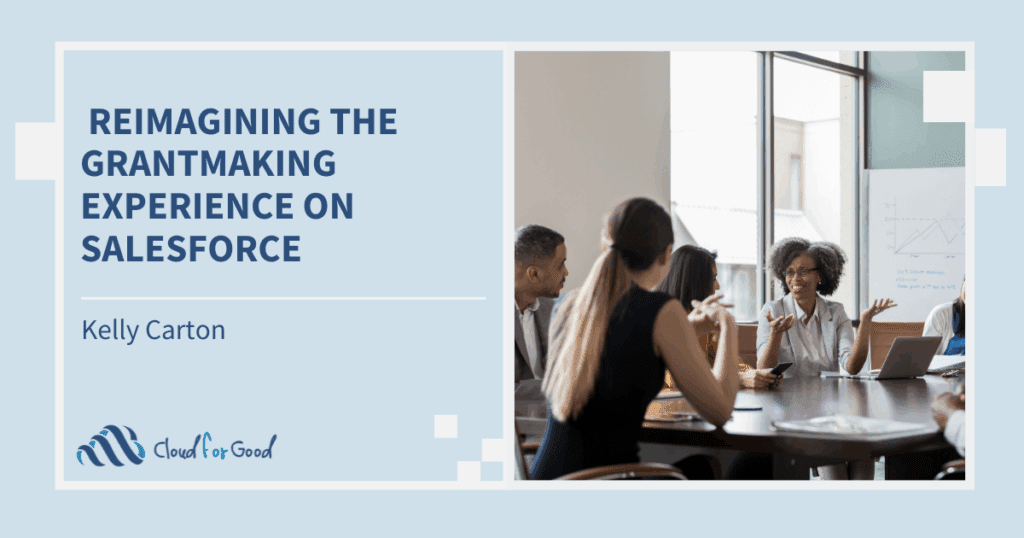For decades, Student Information Systems (SIS) have been considered the backbone of higher education, managing essential records and financials. But they were always meant to be much more—tools that could engage and support students throughout their entire academic journey. Unfortunately, the last generation of SIS fell short. Outdated, clunky, and anything but student-centric, these systems offered uninspiring portals and rigid back-end technology that left students disconnected. As a result, the SIS became little more than a system of record, while the CRM emerged as the true system of engagement, filling the gap in delivering meaningful student interactions.
However, today’s innovations in AI, data, system integrations, and other technologies have offered new opportunities for software providers like Salesforce to fulfill the SIS’s original vision. Salesforce, with support from Cloud for Good, is reimagining what a SIS can and should be by taking the power of a CRM and combining it with the institutional needs of a system of record and student financials—creating a unified platform that is modern, flexible, and built with the student at the center. It is the answer to the questions that the original envisioned SIS sought to solve: a system that could proactively identify at-risk students, automate routine tasks to free up staff, deliver truly personalized experiences for every learner, and leverage AI to reimagine and deliver more meaningful, learner-centered student experiences—all on Education Cloud.
Trends Across the Education Industry
Legacy Technology Creates Disconnected Experiences
Through its work with education leaders and within the SIS space, Salesforce highlighted the expanding role of AI, unified data, and autonomous agents in shaping educational experiences and the growing disconnect between student expectations and institutional reality.
In the Fourth Edition of its Connected Education Report, compiled from more than 2,000 responses from students and staff across six countries, Salesforce found that 70% of staff respondents expressed the need for finding new operational efficiencies, 82% of students reported a need for more personalized and proactive support from their school compared to five years ago, and that 59% of the institutions surveyed plan to upgrade their SIS over the next 3-5 years. Similarly, the traditional SIS has emerged as a monolithic, rigid, siloed system that runs on outdated technology. Salesforce found that—in addition to 75% of U.S. institutions using an SIS that is more than 10 years old—many of these outdated SIS platforms are built on-premises systems. These findings indicate that legacy technology can lead to disconnected experiences for learners, students, and staff, and show where the traditional SIS falls short. The traditional SIS was designed for administrative efficiencies and processes, but not necessarily for creating the kinds of personalized, data-driven experiences that modern learners now expect.
AI Is Changing the Way Institutions Will Operate
Thankfully, AI is changing the way universities and colleges operate. AI is becoming a standard operating practice in nearly all aspects of higher education operations, and through its research, Salesforce found that 83% of education leaders reported that AI tools free up time for higher-value activities and 77% of students reported they would use AI for school processes and tasks time management, advising, and course registration. Thus, many institutions are seeking innovative ways to improve the learner and staff experience with AI, and some are looking to modernize their SIS so that they can leverage AI to help harness and take action on their data.
All of this has led up to Salesforce’s current efforts to create a reimagined, modern, next-generation SIS solution that is purposely built with AI and can support learner-centered experiences in higher education, and Cloud for Good is actively partnering with Salesforce in its efforts to show the value of bringing next-gen SIS and CRM capabilities together on a single platform.
Reimagining the Next-Gen Student Information System (SIS)
A Learner-Centered Approach: A New Operating Model for Higher Ed
Salesforce’s next-generation SIS, built on Education Cloud, puts the learner at the center of everything. Education Cloud helps break down data silos with Data Cloud built in, creating a single source of truth that empowers higher education faculty and staff to deliver personalized experiences for its students at scale.
This learner-centered approach includes:
- Personalized Engagement: From the very first touchpoint, Salesforce’s next-gen SIS enables colleges and universities to deliver tailored communications and experiences that resonate with each individual student.
- Proactive Support: With Salesforce’s AI and predictive analytics capabilities, institutions can identify at-risk students, which gives staff a valuable opportunity to intervene and provide students with the support they need to succeed before problems escalate.
- A Flexible and Scalable Platform: The Salesforce Platform is designed with flexibility and scalability in mind, so institutions can adapt their individual Salesforce platform to their specific current or long-term needs or challenges.
The Power of AI in the Next-Gen SIS
AI is a fundamental component that drives learner centricity in Salesforce’s reimagined, next-gen SIS. By harnessing the power of AI, Salesforce’s SIS makes it possible for institutions to:
- Enhance Student Success: Salesforce AI tools like Agentforce can provide students 24/7 support, from answering basic questions to providing personalized guidance for academics and careers. This is critical, as students with access to AI tools are more likely to report having a positive university experience, according to Salesforce’s Connected Student Report.
- Increase Efficiencies: AI can automate routine or time-consuming tasks and streamline processes, which helps institutions deliver more efficient experiences and services to learners across the education lifecycle.
- Foster Deeper Relationships: With next-gen SIS capabilities, institutional staff are more equipped to build and nurture relationships—not only with current students, but with alumni and prospective students—leading to increased engagement and stronger relationships with students, prospective students, and alumni across the learner journey
Benefits of Bringing CRM and Next-Gen SIS Capabilities Into One Platform
Salesforce’s vision of using Education Cloud to create a learner-centric, AI-powered SIS solution is starting to break ground in real life. Recently, Jessup University became the first university to choose Education Cloud as its new SIS solution, with Cloud for Good as its implementation partner for a launch planned for Spring 2026—demonstrating that a flexible, scalable platform can drive significant return on investment and enhance the student experience.
Jessup selected Salesforce as its SIS solution because of its platform flexibility, which would allow the university to adapt Salesforce around its institutional needs, while driving data integration across the student lifecycle. Ben Huffman, Chief Information Officer at Jessup University, shared that the school is already benefitting from its investment in Education Cloud and the difference that bringing CRM and next-gen SIS capabilities together on a single platform has made. “We’re committed to leveraging innovative, scalable tools that empower our teams and deliver a more personalized, connected experience for students,” said Huffman, whose vision for Jessup is to create a seamless, student-centered technology ecosystem that supports the entire learner lifecycle. “Salesforce has proven to be a strategic platform that delivers measurable ROI and deepens our capacity to engage students in more intentional and impactful ways.”
Why AI-Driven, Learner-Centered SIS Matters
In an era where student expectations are rapidly evolving, the move toward a modern Student Information System is no longer just an upgrade—it’s a fundamental necessity for survival and growth in higher education. Legacy systems, often more than a decade old, create disconnected and impersonal experiences for students and staff alike. The traditional, one-size-fits-all approach is failing to meet the needs of today’s learners, who increasingly expect personalized and proactive support from their institutions.
The future of higher education technology lies in a learner-centric, AI-powered model. Salesforce’s reimagined SIS, built on Education Cloud, offers a path forward by placing the student at the heart of the institution’s operations. By breaking down data silos, this next-generation solution provides a unified view of the student journey, enabling personalized engagement from the very first interaction. The integration of AI is a game-changer, freeing up valuable time for faculty and staff by automating routine tasks and offering predictive insights to support at-risk students proactively. This allows institutions to foster deeper, more meaningful relationships with prospects, current students, and alumni.
As a dedicated Salesforce partner, Cloud for Good is at the forefront of this educational transformation. Our expertise in implementing AI-first, learner-centric SIS solutions on the Salesforce platform empowers colleges and universities to not only meet but exceed the expectations of the modern student. We understand the critical need to create a connected campus, and our proven track record, highlighted by our successful partnerships with institutions like Jessup University, showcases our commitment to building the future of higher education technology. By bridging the gap between next-generation SIS and CRM capabilities, we help institutions unlock the full potential of their data to create truly personalized and impactful learning journeys.





